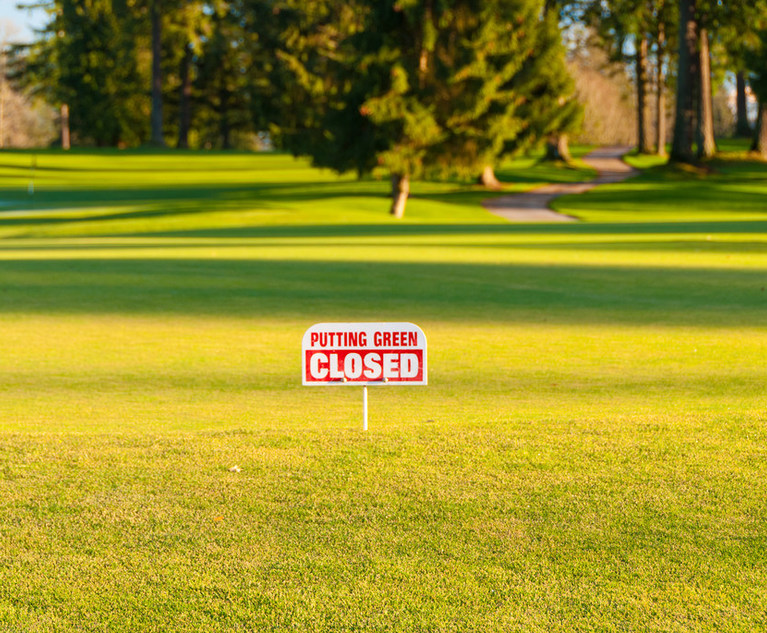
October 23, 2023 | New York Law Journal
The Partial TakingA partial taking may consist of a small taking, yet may cause substantial damage to the remainder. Indeed, it may leave a valueless remainder. Property owners should be aware of their right to just compensation.
By Michael Rikon
8 minute read

October 20, 2023 | New York Law Journal
New Proposed EEOC Harassment GuidanceThe U.S. Equal Employment Opportunity Commission has issued its Proposed Enforcement Guidance on Harassment in the Workplace, which includes comprehensive guidance on different types of harassment and associated liabilities. This article provides an overview of the proposed guidance.
By David E. Schwartz and Emily D. Safko
7 minute read

October 20, 2023 | New York Law Journal
Dartmouth's Closed Golf Course: Who Can Play in Court?This article discusses a case in which an alumnus made a $1.8-million gift to Dartmouth College to upgrade and maintain its golf course. However, Dartmouth subsequently closed the course and sought to repurpose the donor's gift.
By Conrad Teitell
4 minute read

October 19, 2023 | New York Law Journal
Breaking the Crisis Narrative: Moving Beyond BansThe immigration "crisis" narrative of recent years misses an important point: that the instinct to ban refugees has forced the current predicament in the first place. Further, this reactionary path has weakened the federal government's capacity to respond constructively to global displacement.
By Mariko Hirose
5 minute read

October 19, 2023 | New York Law Journal
When Forum Selection Clauses Collide With the Internal Affairs DoctrineHistorically, New York courts have viewed the internal affairs doctrine as strict and mandatory; however, they have recently softened this approach and apply a more discretionary standard. This article examines the evolution of these judicial approaches and recent Commercial Division cases reflecting their application.
By Thomas J. Hall and Judith A. Archer
10 minute read

October 18, 2023 | New York Law Journal
Broadening the Hiring Criteria for Legal Jobs Would Benefit Minorities, ClientsIn this article, second-year law student Lola Todman makes a case for why the criteria that qualifies candidates for legal jobs should be broadened and emphasizes that broadening this criteria should not be confused with weakening it.
By Lola Todman
5 minute read

October 18, 2023 | New York Law Journal
'Hyatt Hotels': Are Omissions From Gross Income an Accounting Method?'Hyatt Hotels v. Commissioner' underscores that even an approach to accounting for income and expenses that has been applied consistently by a taxpayer over many years is not necessarily a "method of accounting" subject to the government's broad power to impose adjustments under Section 481(a).
By David E. Kahen and Elliot Pisem
10 minute read

October 18, 2023 | New York Law Journal
Georgetown Global Antitrust Enforcement Symposium and Fordham Conference on International Antitrust Law and PolicyRecently, Georgetown Law hosted its 17th Annual Global Antitrust Enforcement Symposium and Fordham Law hosted its 50th Annual Conference on International Antitrust Law and Policy. This article highlights some topics discussed at these events, such as DOJ and FTC draft merger guidelines, merger enforcement and remedies, labor, AI and international enforcer perspectives.
By Karen Hoffman Lent and Kenneth Schwartz
11 minute read

October 17, 2023 | New York Law Journal
An Overview of Federal and State Franchise Laws, Rules and RegulationsWhen franchising burst on the American economic scene in the 1950s and 1960s, no franchise-specific laws, rules or regulations were there to greet it. This article provides an overview of the laws, rules and regulations that have since developed that govern franchising in the United States.
By David J. Kaufmann
9 minute read

October 16, 2023 | New York Law Journal
Striking Improper Use of Settlement CommunicationThis article focuses on 'My Mavens v. Grubhub' and discusses how courts are unlikely to allow parties to base their allegations in a pleading on information they learned during settlement discussions, even if the information could later be obtained through discovery.
By Edward M. Spiro and Christopher B. Harwood
8 minute read
Trending Stories
- 1With a 7-Figure Book Deal and TV Adaptation on the Way, This Dechert Associate Remains Committed to Her Day Job
- 2Northwestern University Pritzker Law School Hit With Reverse Discrimination Lawsuit
- 3Biden Will Be First Lawyer-President Without a JD From the 'T-14' in a Century
- 4The Week in Data: A Look at Legal Industry Trends by the Numbers
- 5Settlement reached in lawsuit over death of clerk prior to $51 million jury award
More from ALM
- Morgan & Morgan Class Action Attorneys Detail Pathway to Success Within Cybersecurity and Data Privacy Practice 1 minute read
- Holwell Shuster & Goldberg Partners Leverage 'Hostile' Witnesses to Secure $101 Million Verdict Against Walmart 1 minute read
- Legal Speak at General Counsel Conference Midwest 2024: Mike Andolina, Partner, White & Case 1 minute read



